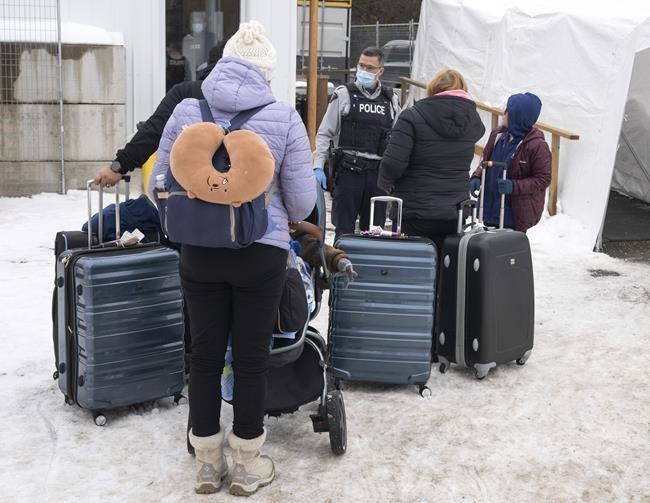WASHINGTON — Canada and the United States both support a holistic, long-term approach to their shared immigration challenges, Immigration Minister Sean Fraser said Tuesday after a meeting in the U.S. capital with Homeland Security Secretary Alejandro Mayorkas.
Both the federal Liberal government in Ottawa and President Joe Biden's administration are under mounting political pressure to do something about the growing number of migrants who circumvent legal channels to enter their respective countries.
But the problem is not one that will respond to quick fixes, Fraser told a news conference at the Canadian Embassy after his meeting.
"Migration is a reality that we're going to continue to deal with," Fraser said.
"But if we implement measures at the Canada-U.S. border and throughout the pathway for migrants' journeys, my sense is we're going to be able to have meaningful progress in the years ahead."
Those measures, he said, include expanded access to immigration programs, a scaled-up humanitarian program for those fleeing violence or persecution and communicating with would-be migrants in their home countries to alert them to legal options.
"The long-term piece is going to come through a community of nations around the world who address irregular migration seriously by making sure that we're addressing the root cause, whether it's poverty or violence or persecution," Fraser said.
"This is going to be a continued project for the world and for generations to come."
Quebec Premier François Legault has been pushing the federal government to do something about the tens of thousands of would-be asylum seekers pouring into the province from the U.S. each year.
In response, Prime Minister Justin Trudeau has publicly acknowledged that it's time for Canada and U.S. to renegotiate the 2004 immigration treaty that creates an incentive for migrants to sneak onto Canadian soil.
The Safe Third Country Agreement, as it's known, allows both Canada and the U.S. to turn away refugee claimants from a third country who try to make a claim for asylum at an official entry point.
That treaty, however, doesn't cover claims by migrants who arrive in Canada by entering between official crossings, such as at Quebec's Roxham Road, the country's busiest unofficial entry point.
More than 39,000 claims were filed in 2022 by people who were intercepted by the RCMP, the vast majority of them in Quebec.
Fraser said he and Mayorkas had a "very useful conversation" about the treaty and both sides committed to "continuing our work," but he demurred when asked whether his counterpart had shown any enthusiasm for renegotiating it.
"Let's not pretend this is the first or only time that Canada and the U.S. have engaged on issues around irregular migration," Fraser said.
"This is a shared priority for good reasons, and when we have news to share on any updates specifically, of course we'll do that. We're going to do that in lockstep with our partners."
Legault has urged Trudeau to raise the issue with Biden, who is expected to make his first official in-person visit north of the border later this month.
"Roxham Road will have to be closed eventually, whether we like it or not," Legault wrote in a letter to the prime minister last month.
"Quebec has a long tradition of welcoming refugees, and we are proud to contribute to this humanitarian duty. However, this influx cannot continue…. The capacity to receive refugees has been greatly exceeded."
But slamming the door there would only lead to migrants finding other opportunities to slip over the border between official entry points, Fraser noted.
Mayorkas, meanwhile, has been targeted by Republican rivals on Capitol Hill who want to hold him and the rest of the administration to account for what they call a "crisis" of illegal immigration in the U.S.
As part of that effort, some of Biden's critics have taken to talking more and more about the Canada-U.S. border, though the scope of irregular migration is nowhere near the numbers at the U.S.-Mexico frontier.
They've formed the Northern Border Security Caucus, a new coalition of 28 Republican members of Congress who say they are concerned about the influx of drugs, crime and undocumented migrants from Canada.
The group acknowledges that the perils of the northern border pale in comparison to the escalating migratory crisis south of the Rio Grande.
But they cite a steady increase in recent months in the number of "encounters" between border agents and people lacking U.S. legal status as evidence that the problem is likely to get worse before it gets better.
Some blame the lack of visa requirement for travellers from Mexico into Canada and what they consider a less stringent approval process for student visas than the U.S. has, but Fraser said there are no plans to revisit the rules surrounding which countries require a visa.
"We don't have plans to to change our posture with respect to the Mexican visa," he said.
"Right now our focus when it comes to irregular migration or the number of asylum seekers has been working with the United States to make sure that we can deal with the situation on the Canada-U.S. border at the same time that we work within Canada."
From October through January, the first four months of fiscal 2023, U.S. Customs and Border Protection recorded 55,736 encounters at or near the northern border with people deemed inadmissible to the U.S.
That was more than twice the nearly 24,000 encounters during the same four months the previous year, and already halfway to the 109,535 reported during the entire 12-month stretch of fiscal 2022.
This report by The Canadian Press was first published March 7, 2023.
James McCarten, The Canadian Press



